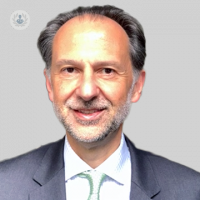Benign prostate englargement: what is it and who does it affect?
Written in association with:Benign prostate enlargement affects an estimated 80% of men over 70 in the UK. It is a condition which can seriously affect quality of life, and cause people to worry about their prostate health. Here, leading urologist Mr Marc Laniado explains what prostate enlargement actually is, and how it can affect overall health.

What is benign prostate enlargement?
In this condition, the prostate becomes bigger disturbing the urinary flow. BPE is important because disturbance in urinary symptoms interferes with living a normal life, can be painful and sometimes cause serious ill-health. By age 50 years about 3 in 10 men will have it and by 70 years almost 8 in 10 men will be suffering with BPE.
What are the symptoms of an enlarged prostate and how is it diagnosed?
Initially, men may notice they pass urine more frequently than their peers and at night. They may also notice that it takes a while to get started when reaching the toilet and the flow is less strong. At a public toilet, the flow may not hit the wall, but dribble in front of their feet. These symptoms may deteriorate over time such that the urinary flow stops and starts, and that it takes a long time to finish passing urine. If a urine infection occurs, then these symptoms become exacerbated, it hurts to pass urine, the urine smells foul and blood may be seen in the urine. Stones can also cause urine infections and pain in the lower belly. Some men suddenly become unable to pass urine at all. This is very painful and will make a man go to the Accident/Emergency department even if he did not want to visit a doctor before!
What causes BPE?
As with all things in medicine, the causes of BPE are incompletely understood. Age is the most important factor such that 40% of men aged 50 may have evidence of BPH, and this increases further with age. Studies on twins and families of men with BPE have shown a family history is important for more than half if BPE occurs under 60 years of age. For men with relatives who require surgery for BPE, the risk for BPE-related surgery is increased four-fold.
Black men are more likely than white men to have BPE, whereas Asian men are less likely to have BPE. BPE is associated with heart disease, use of drugs known as beta-blockers and lack of physical exercise. Fat appears to be important as it induces inflammation, which in turns causes BPE. BPE is more common in obese men, and certain dietary fats may induce inflammation. Prostatitis, which is inflammation of the prostate, is associated with an enlarged prostate and BPE. Relatively uniquely in the body, prostate tissue reverts to an embryonic state in which it is more sensitive to chemicals signals, known as growth factors, in the fluid that bathes the cells. Consequently, the cells grow.
Can a benign enlarged prostate lead to cancer?
There is no causal relationship between an enlarged prostate and prostate cancer, although it has been speculated that there might be. In men with BPE, the prostate becomes enlarged and a marker called PSA in the blood becomes elevated. This is because the level of PSA is proportional to the size of the prostate. PSA is also produced excessively by prostate cancer and so a high PSA can be used to identify men who might have prostate cancer. However, men with BPE have large prostates and so higher levels of PSA anyway. Consequently, they get tested for prostate cancer more intensely than men with small prostate who do not have their PSA elevated.
When men with an enlarged prostate visit doctors, the PSA test is often done and prostate cancer is consequently found almost by chance. The cancer would possibly not have been diagnosed had the men not visited their doctors because of urinary symptoms.
Find out how BPE can be managed and treated here.


